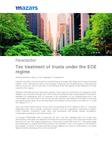
Tax treatment of trusts under the ECE regime
Last April 10, 2018, the Dian issued the "Unified General Concept of the Regime of Foreign Controlled Entities - ECE". Although the same, in its 32 pages, introduces innumerable opinions -some right and others not so much- we will only refer in this writing to those that specify the tax treatment of Trusts under the ECE regime.
Although international trusts have been used for many years as mechanisms to reorganize family estates, only since 2014, through Law 1739 of 2014, their existence was recognized by the Colombian legislation by establishing that, for purposes of the declaration of the complementary tax of tax normalization, the rights held in such foreign vehicles would be assimilated to trust rights in Colombia and therefore their equity value would be determined based on the provisions of Article 271-1 of the Tax Statute ("E.T.").
Now, Law 1819 of 2016 (last tax reform) when incorporating the ECE Regime to the E.T., expressly established that "ECEs include investment vehicles such as corporations, autonomous estates, trusts, collective investment funds, other trust businesses and private interest foundations, incorporated, operating or domiciled abroad (...)".
In Concept 1002022208-1440 of December 20, 2017, the Dian indicated that if the Trusts were structured as irrevocable, the obliged to normalize the economic rights in the same was whoever had the economic use of its underlying patrimony, in the terms of article 263 of the E.T., This article states that "possession is understood as the economic use, potential or real, of any asset for the benefit of the taxpayer" and that "it is presumed that whoever appears as owner or usufructuary of an asset takes economic advantage of it for his own benefit".
The Unified General Concept of the ECE Regime answers the question of "who must comply with the obligations of the ECE regime in the cases in which there is a right subject to a suspensive condition", such as in the cases in which the beneficiaries of the Trust, being Colombian tax residents, only have a future expectation to receive a yield and/or the remainder of the patrimony of such vehicle. In this sense, the Concept indicates that, according to the provisions of article 1536 of the Civil Code "the condition is called suspensive if, while it is not fulfilled, it suspends the acquisition of a right". Thus, it indicates that those Colombian tax residents who effectively have the right to receive such benefits, and not those who simply have a future expectation or a conditioned right to do so, will be called to comply with the obligations of the ECE regime (to declare in Colombia the passive income from such foreign vehicles).
It is essential to review that the text of the Trust stipulations is adapted to the guidelines established by the Dian. Thus, if the Trust is structured as irrevocable and its management is discretionary (understood as the Trustee or fiduciary can distribute the benefits at its free disposal), its beneficiaries, not having a right, or having it conditioned, cannot be considered as controllers and therefore will not be obliged to comply in Colombia with the provisions of the ECE regime.


